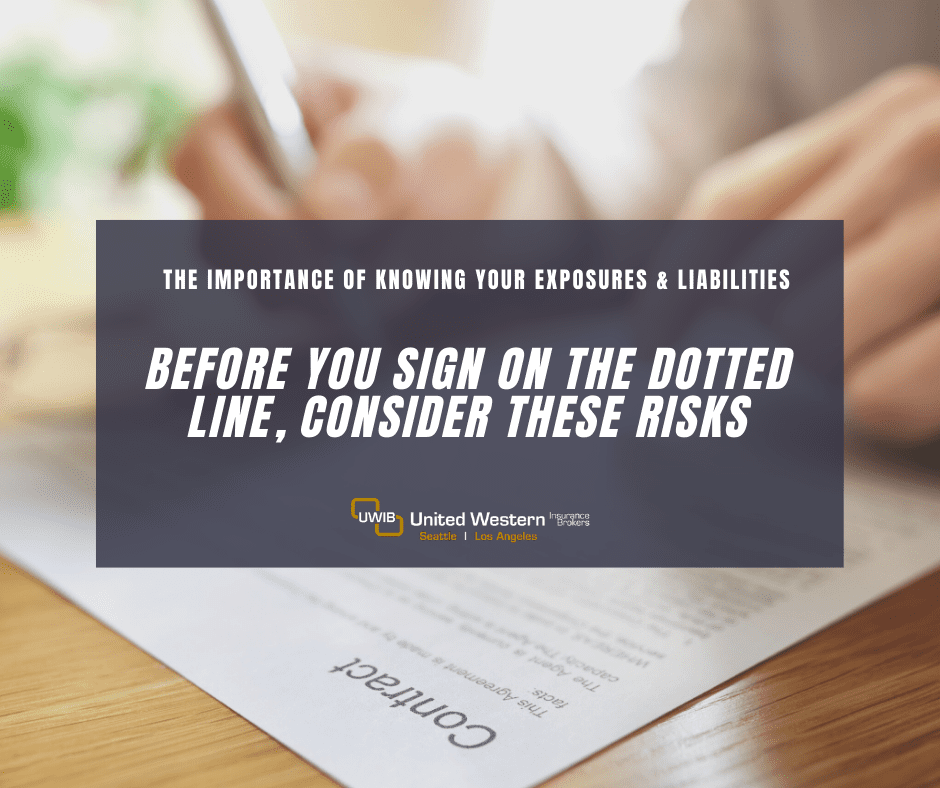Contracts are a common and unavoidable part of our modern lives. Whether it’s starting a new job, hiring a landscaper, or buying/selling a vehicle, there’s no getting around the need to sign contracts. In an ideal world, an agreement should protect both you and the other signing parties: each party should be contractually responsible for their own negligence. In the real world, this isn’t always the case.
It’s not unusual for contracts to contain an indemnity clause. By “indemnifying” the other party, such a clause places all risk and responsibility on you. If you agree to these terms, you virtually agree to protect the other party in the contract, and your liability insurance may have to defend and pay damages assessed against someone else, for their own negligence!
For a real-world example of what this could look like, imagine you own a janitorial service that serves commercial buildings. The property management of one of your buildings requires you to indemnify them for “any and all occurrences” in your service contract. Later, a fire breaks out that was unrelated to your services, however, your company is left with the bill for damages because of that indemnification. This sounds bogus, but this situation has actually happened, and the janitorial service was legally liable due to that contract!
While it sounds unfair to be left footing the bill for something you’re not responsible for, you may technically be OK – if your general liability insurance is broad enough and does, in fact, extend protection to other parties. However, if your insurance contains limitations or exclusions that preclude this type of coverage, you will be on your own for any liability and damages. For this reason, it is vital that you carefully read every contract you are negotiating and make sure you thoroughly grasp its implications before you sign.
It’s not uncommon for contracts to require one party to add the other as an additional named insured, alone, or in addition to, indemnification. If you do nothing else, the one thing you should do each and every time you sign a contract that even hints at indemnification is to ask your insurance agent to review it and point out where your uncovered risks may be. It’s also a good idea to consult a lawyer for the same reason. These steps will cost a little extra upfront, but you will know where you may be exposed to liability and then be able to take the steps to cover those risks—or to renegotiate the contract with more favorable terms before you sign it!
Here are some suggestions to consider before you sign any contract that asks for indemnity and/or naming additional insureds:
– Negotiate to remove or revise the contract so that you agree to be responsible only for your negligence, not that of the other party.
– If you cannot achieve that, try to negotiate your responsibility to only cases when both parties are jointly negligent.
– Ask for the request for additional named insured status to be removed.
– If the additional named insured is non-negotiable, ask for the contract to specify the additional insured will not be covered for their sole negligence (i.e. your party had no part in the negligence).
– Consult your insurance agent to learn if it would benefit you to have an owner’s and contractors protective liability (OCP) insurance policy satisfy the requirements of your contract, instead of adding the other party to your general liability insurance.
When negotiating these terms, you may need to be willing to give something up on your end – price, for example – in order to get the indemnification portion to your liking. The other party may have greater bargaining power but this does not change the fact that only you can look out for your own best interests when it comes to negotiating a contract.
While we always encourage you to deal in good faith and expect the same from other parties, it’s essential to know the dangers of signing a contract that indemnifies the other party. Assuming responsibility for the sole negligence of another can erode your insurance limits, adversely impact your liability insurance loss experience, increase your liability insurance premiums, and even create a reason for your insurance company to deny renewal in the future.
Our goal is to empower our clients with information that helps them to make well-informed decisions before agreeing to contractual terms that could result in unknown exposures to uncovered financial risks.
If you would like us to review a contract to identify exposed risks and provide options on how you can address these risks, contact us today.
